Vietnam is on the threshold of a technological and innovation revolution. The question is no longer "do we have potential?", but "how can we break through?".
With aspirations, talented human resources and available opportunities, Vietnam needs a comprehensive strategy and close coordination to not stop at potential. Resolution 57-NQ/TW of the Politburo is expected to be "the shortest path to bring the country to a bright future".
The guiding viewpoints of the Party and State have clearly affirmed that the development of science , technology, innovation and digital transformation are the top important breakthroughs and the main driving force for the rapid development of modern productive forces.
Resolution 57 also emphasizes the need to focus national resources on investing in science, technology, innovation and digital transformation development; at the same time, maximizing Vietnam's potential and intelligence in association with quickly absorbing and mastering the world 's advanced scientific and technological achievements.
This means that Vietnam cannot spread its investment across all sectors but needs to make strategic choices, focusing on sectors with high spillover potential and the ability to lead the future.
Semiconductor industry and microchip design are currently considered one of the strategic technologies that Vietnam needs to focus on developing.
General Secretary To Lam has directed the urgent issuance of a list of strategic technologies, with special emphasis on the semiconductor industry, with the goal of making Vietnam an important link in the global supply chain.
According to Prof. Dr. Nguyen Duc Khuong, Chairman of AVSE Global (Global Vietnamese Science and Expert Organization), the semiconductor industry is a profession that requires a very high level of science and technology, technology control, and sophistication.
In the future, this will still be an industry that has a great influence on the development of the economy, especially in the electronics, telecommunications, science and space industries.
Vietnam's ability to participate in the global value chain, create new values and partially master technology in the semiconductor industry will help reduce international dependence and ensure that development is not negatively affected.
Key technology enterprises have also recognized the importance of this field and have plans to invest in research, design, and manufacturing of semiconductor chips; although they still face many difficulties due to limitations in mechanisms and the need for large investment resources. However, Resolution 57 has opened up great opportunities with special mechanisms in researching, accessing, purchasing technological secrets, learning, and copying advanced foreign technologies.
Artificial Intelligence (AI) and Big Data are also identified as new and strategic areas where Vietnam is seriously lacking in high-quality human resources. However, these are also technologies with the potential for widespread application, helping to improve labor productivity, production and business efficiency and develop new services.
General Secretary To Lam emphasized that data has become an important resource and means of production, the "blood" of the digital economy. Effective data management and the application of technologies such as AI, Big Data, and Blockchain are extremely important.
For AI to work effectively, there needs to be a data center and the data must be accurate. Resolution 57 also clearly states the need for a special mechanism in researching, accessing, and purchasing technological secrets related to AI.
Determining the strategic technology portfolio needs to be based on in-depth, thorough research, taking into account traditional strengths, internal resources, future potential, understanding of global value chains, geopolitical risks and trends in science and technology development.
Vietnam needs to take advantage of the opportunity when it possesses an abundant, young, well-trained labor force and attracts investment from foreign corporations.
"Standing on the shoulders of giants" is the right approach, taking advantage of the world's technological achievements to quickly develop products serving Vietnam's socio-economy and increasing international competitiveness.
To achieve breakthrough developments in the new era, Vietnam needs to focus on breaking down policy bottlenecks and bottlenecks that are holding back the development of science and technology, innovation and digital transformation.
Bold policy sandboxing, aggressively cutting administrative barriers, and focusing resources on Research and Development (R&D) are key.
The sandbox mechanism or policy experiment is considered an important platform for businesses, especially small and medium-sized enterprises, to exploit new technologies such as AI, blockchain, and crypto assets.
Resolution 57 also reflects the spirit of allowing piloting for new practical issues. This creates a safe, controlled environment for new technologies and business models to be tested without fear of immediate legal risks.
The policy of exemption from liability in case of failed testing mentioned in Resolution 57 is also a breakthrough solution, encouraging businesses to boldly experiment with strategic technologies.
Complicated and lengthy administrative procedures are also one of the major barriers to business development and innovation. Reducing administrative barriers, especially through digital transformation of administrative procedures, will help businesses significantly reduce time and costs, creating favorable conditions for production and business activities and economic development.
Resolution 57 emphasizes the need to simplify administrative procedures and decentralize power in the state management system to effectively implement digital transformation.
Resolution 57's solutions have allowed for risk acceptance in scientific research and eliminated human resource mechanisms to attract high-quality labor for R&D. Focusing national resources on investment in science, technology, innovation and digital transformation development is one of the important guiding principles of the Resolution.
Another important thing is to take into account internal resources and future potential to come up with a list of strategic technologies that need to be focused on investing in R&D. Restructuring the budget for science and technology to ensure concentration, focus, and key points, and not spread out is also something that needs attention.
Investing in training high-quality human resources and building a generation of future masters is a key factor for Vietnam to make a breakthrough in the new era, especially under the strong impact of the Fourth Industrial Revolution.
Dr. Pham Huy Hieu, lecturer of Computer Science & Engineering, VinUni University, Head of Research, Vietnam University and College Innovation Network, said that Resolution 57 "emphasized the importance of developing and utilizing high-quality human resources and talents to meet the requirements of science, technology, innovation and national digital transformation.
Resolution on promulgating a special mechanism to attract overseas Vietnamese and highly qualified foreigners to return to Vietnam to work and live.
Vietnam is in a global race to develop high-quality IT human resources, not only to meet domestic needs but also to export highly skilled labor.
To do this, breakthrough policies and strategic solutions are needed to train, attract and retain talent.
To improve the quality of training, it is necessary to combine many specific solutions such as: Updating training programs, applying international standards to teaching, enhancing practice and learning based on real projects. In particular, promoting cooperation between businesses and universities and research institutes is a key factor.
Enterprises need to come up with topics, human resource development requirements and science and technology requirements according to socio-economic development and universities need to meet them.
Enterprises also need to directly participate in the training and research process of universities, provide in-depth internship opportunities and support scholarships. The establishment of innovation centers connecting institutes - schools - enterprises also needs to be promoted.
Universities and research institutes can be considered the core of the ecosystem for developing science, technology and innovation. Experts believe that there needs to be close cooperation and co-operation between the State, businesses and universities.
To make a breakthrough, Vietnam needs to build a dynamic and effective national innovation ecosystem. This ecosystem requires the active participation of the State, businesses, research institutes, universities and innovation support organizations.
Businesses need to play a central role in this ecosystem, absorbing research results and posing practical problems to scientists.
Associate Professor Dr. Ta Hai Tung (Rector of the School of Information and Communication Technology - Hanoi University of Science and Technology) said that it is necessary to build research centers in association with advanced countries. These clusters will be the place where universities, research institutes and businesses converge, creating a favorable environment for knowledge sharing, research cooperation and commercialization of scientific and technological results.
Ho Chi Minh City is also recommended to build centers for popularizing artificial intelligence, big data and the Internet of Things, taking advantage of domestic expert resources. Focusing on key investments to form stronger science and technology organizations and concentrating resources on science and technology infrastructure is also mentioned in Resolution 57.
In addition, incubating and protecting technology startups is an indispensable factor for the sustainable development of the innovation ecosystem. The government needs to have strong support policies for businesses and technology startups, creating favorable conditions for them to invest in Research and Development (R&D) at universities.
To promote innovation, attracting experts and overseas Vietnamese intellectuals plays an important role. Experts agree that it is necessary to apply attractive remuneration policies such as reducing personal income tax for information technology experts, while creating an attractive working environment to attract domestic and international talent.
Building and developing a network of domestic and international experts and scientists is also an important solution. Professor Nguyen Duc Khuong believes that there needs to be very good minds, people, and scientists capable of leading Vietnam's scientific professions, including overseas Vietnamese and international experts.
To activate the national innovation ecosystem, Vietnam will need to synchronously deploy the above solutions. Close coordination between the State, enterprises, universities and research institutes will become the key factor for these solutions to be put into practice, making science, technology and innovation a strong driving force for Vietnam's development.
Resolution 57 identifies enterprises as the center, the subject, the main resource and driving force for the development of science, technology, innovation and digital transformation.
Enterprises, especially pioneering technology enterprises, play an important role in applying new technologies into practice, reducing dependence on foreign technology and enhancing national innovation capacity.
To encourage investment in strategic technology, a liability waiver policy in case of failed experiments is considered a breakthrough solution, helping businesses be more confident in new projects.
Professor Nguyen Duc Khuong believes that to develop science and technology, we often need financial resources, human resources, mechanisms, and a very high capacity for international cooperation. We will need leading businesses to take the lead so that they can create big problems.
Then, from having a big problem, they will connect to create an ecosystem with small and medium-sized enterprises with research capacity and the ability to absorb science and technology to work together to solve the big problems of a country.
Another key factor mentioned by experts is the change in development thinking, shifting from production to innovation. Associate Professor, Dr. Dang Van Dong hopes that Resolution 57 will contribute to changing the thinking of scientists and businesses, towards more flexibility and creativity instead of a rigid approach.
Enterprises need to proactively invest in R&D, creating new products and services based on science, technology and innovation. Close cooperation between enterprises, universities and research institutes is considered a key factor to promote the application of science and technology into practice and commercialize research results.
For enterprises to truly become the center of breakthroughs, Vietnam needs to create conditions for large enterprises to confidently invest in core technology, while "digitally energizing" small and medium enterprises through policies supporting digital transformation and application of science and technology.
More importantly, there needs to be a strong shift in development thinking, from focusing on production to valuing creativity and innovation, with close links between businesses, scientists and research organizations.
For Vietnam to truly make a breakthrough and become a developed, high-income country by 2045, effective implementation of Resolution 57 is extremely important.
From choosing the right industry, focusing on strategic technologies, breaking down policy bottlenecks and bottlenecks with revolutionary changes, investing in training high-quality human resources to master the future, activating the national innovation ecosystem with the participation of all components, to placing enterprises at the center of breakthroughs - all are fundamental steps that need to be implemented synchronously and drastically.
With the right strategy of "standing on the shoulders of giants", Vietnam will soon "create a role" for itself. Breakthrough is not a miracle. This is the inevitable result of the consensus, right direction and consistent actions of the Party, the State and the entire people and society.
Content: Nam Doan, Bao Trung, The Anh
Design: Duc Binh
05/07/2025 - 06:52
Source: https://dantri.com.vn/cong-nghe/de-viet-nam-but-pha-huong-di-tu-nen-tang-den-hanh-dong-20250506173246427.htm




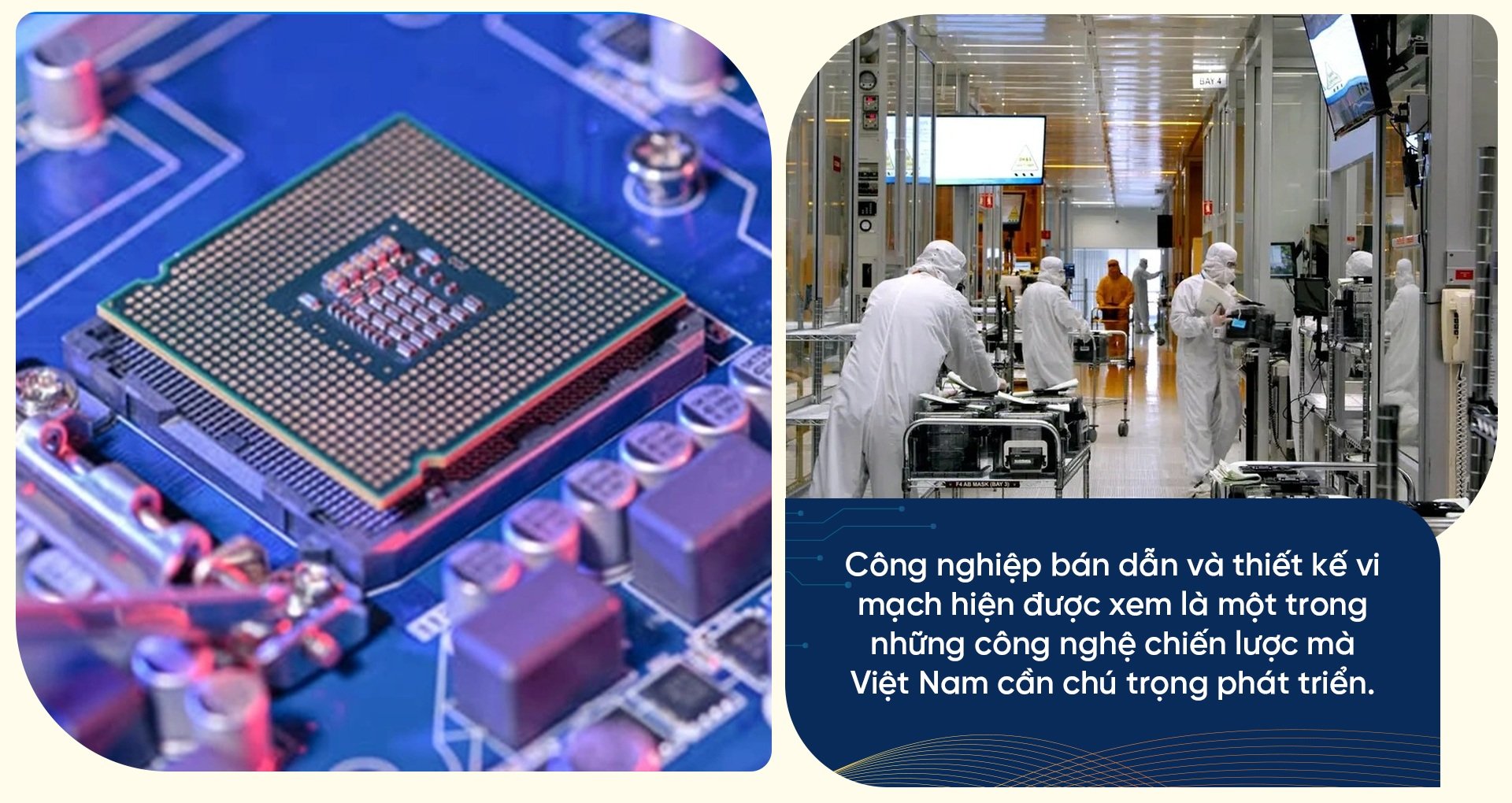
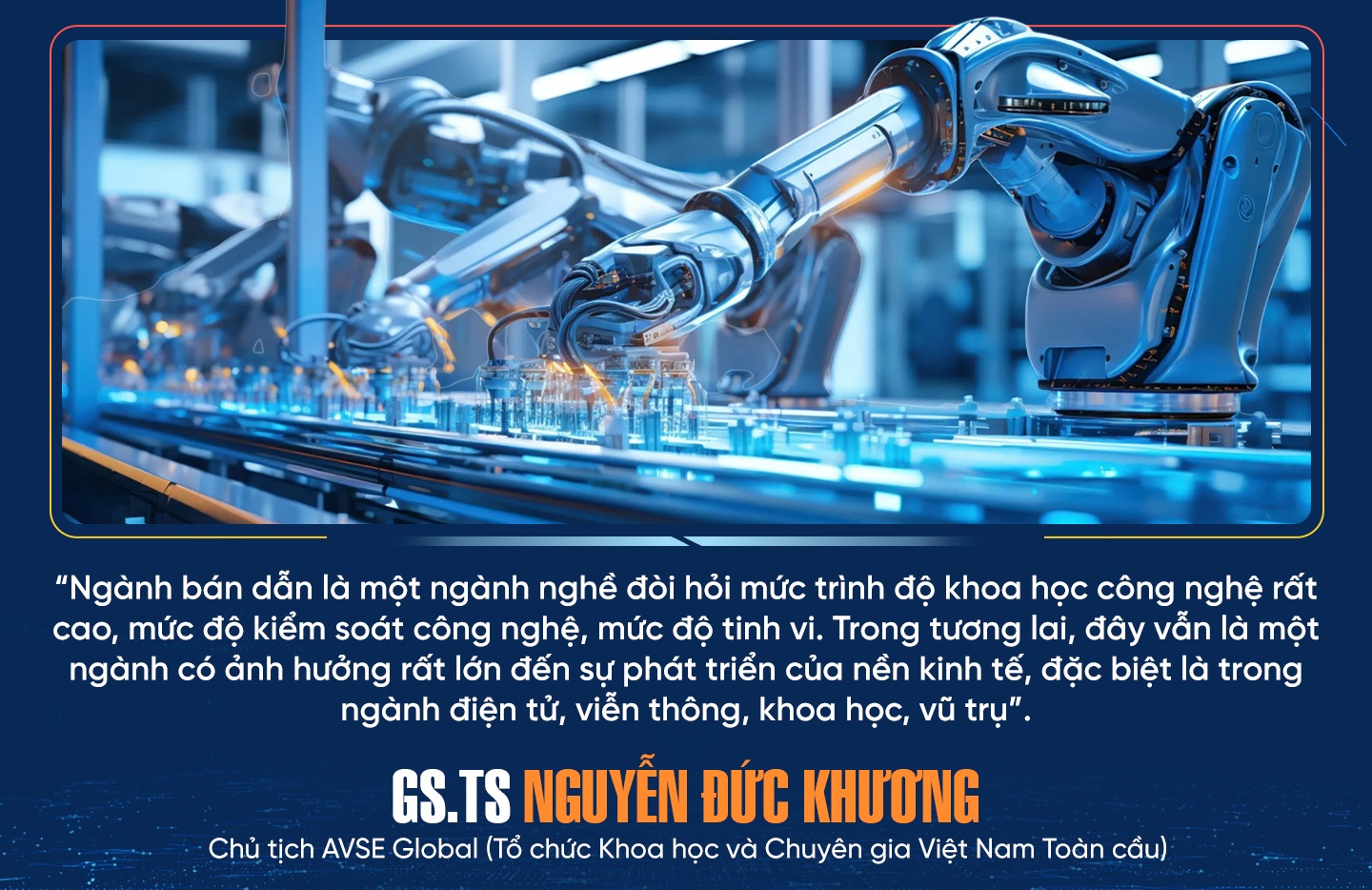

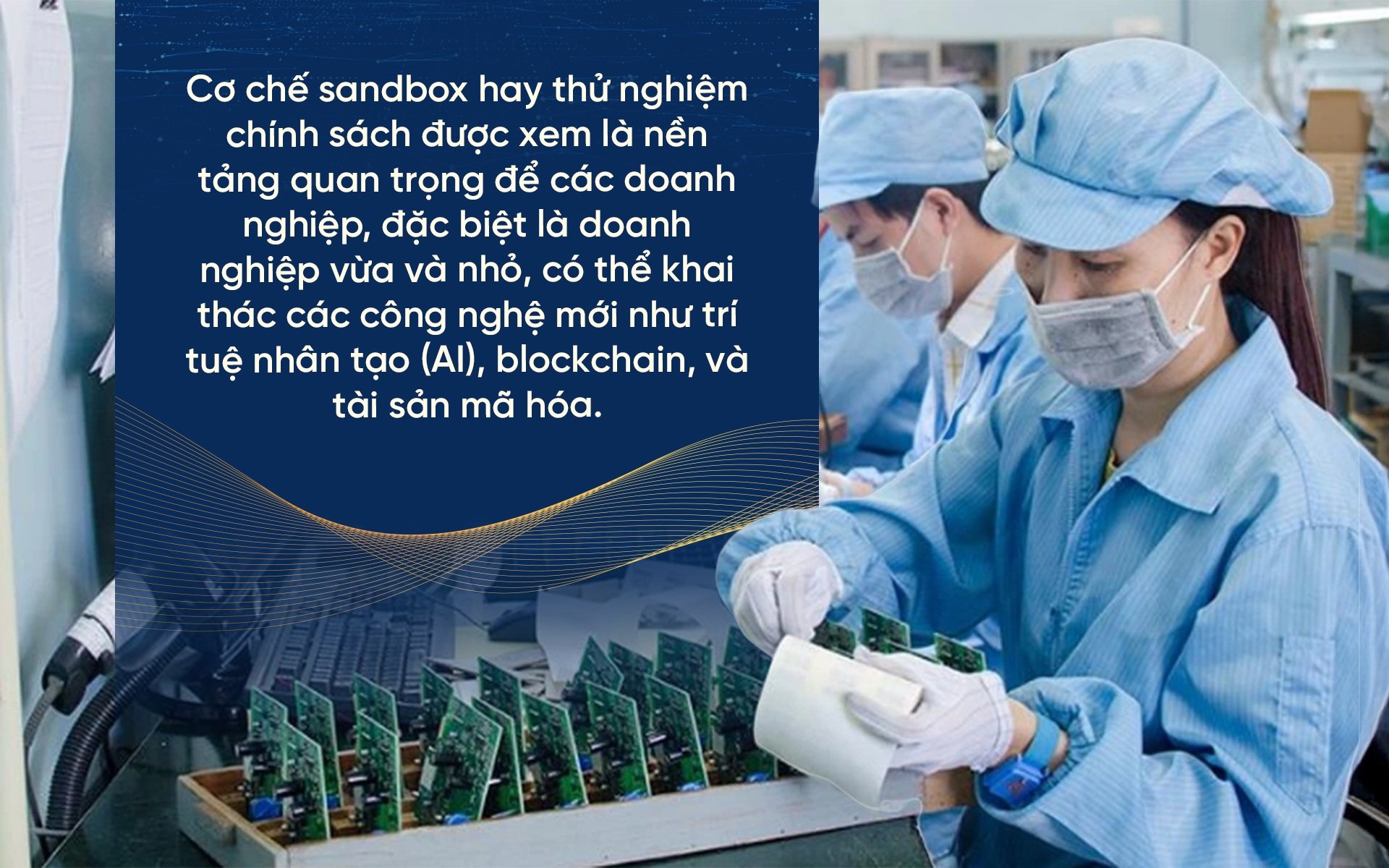

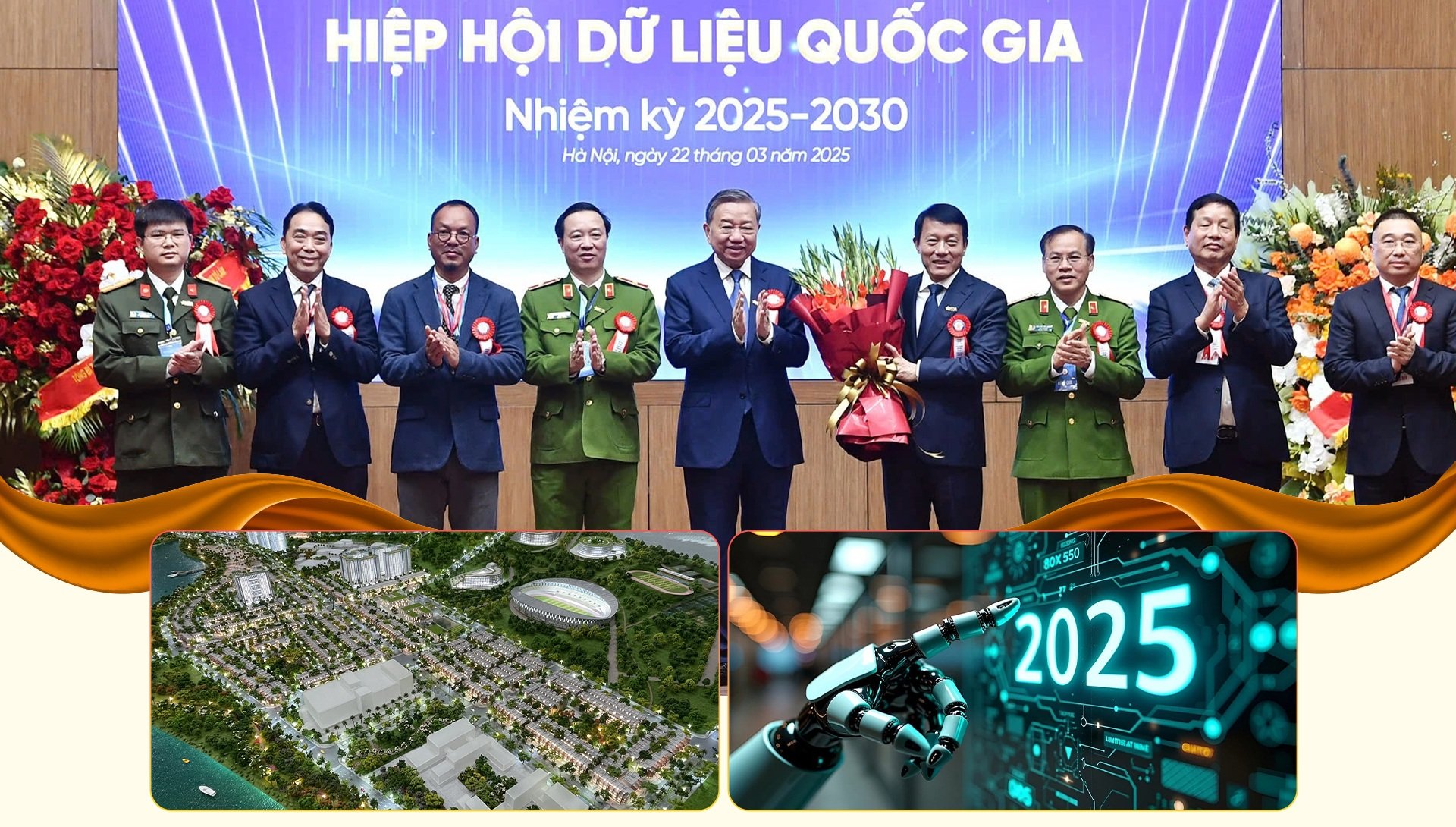

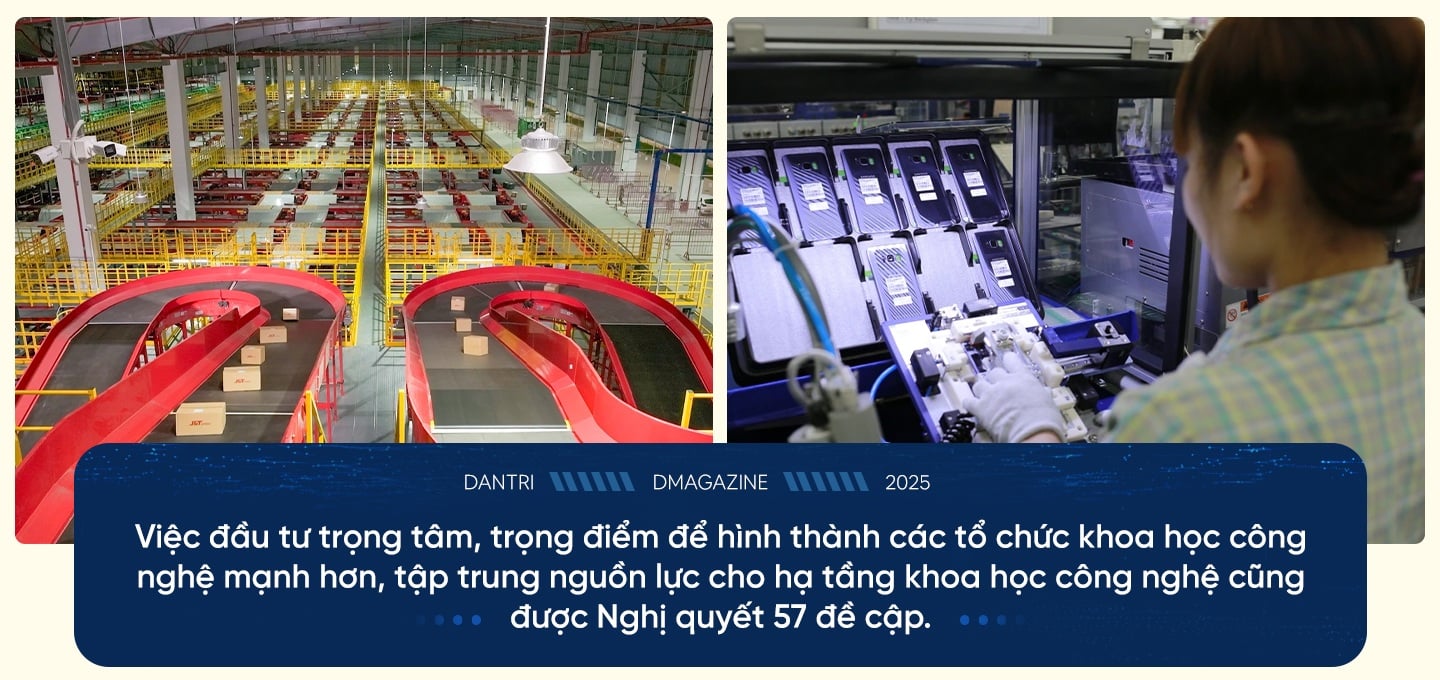

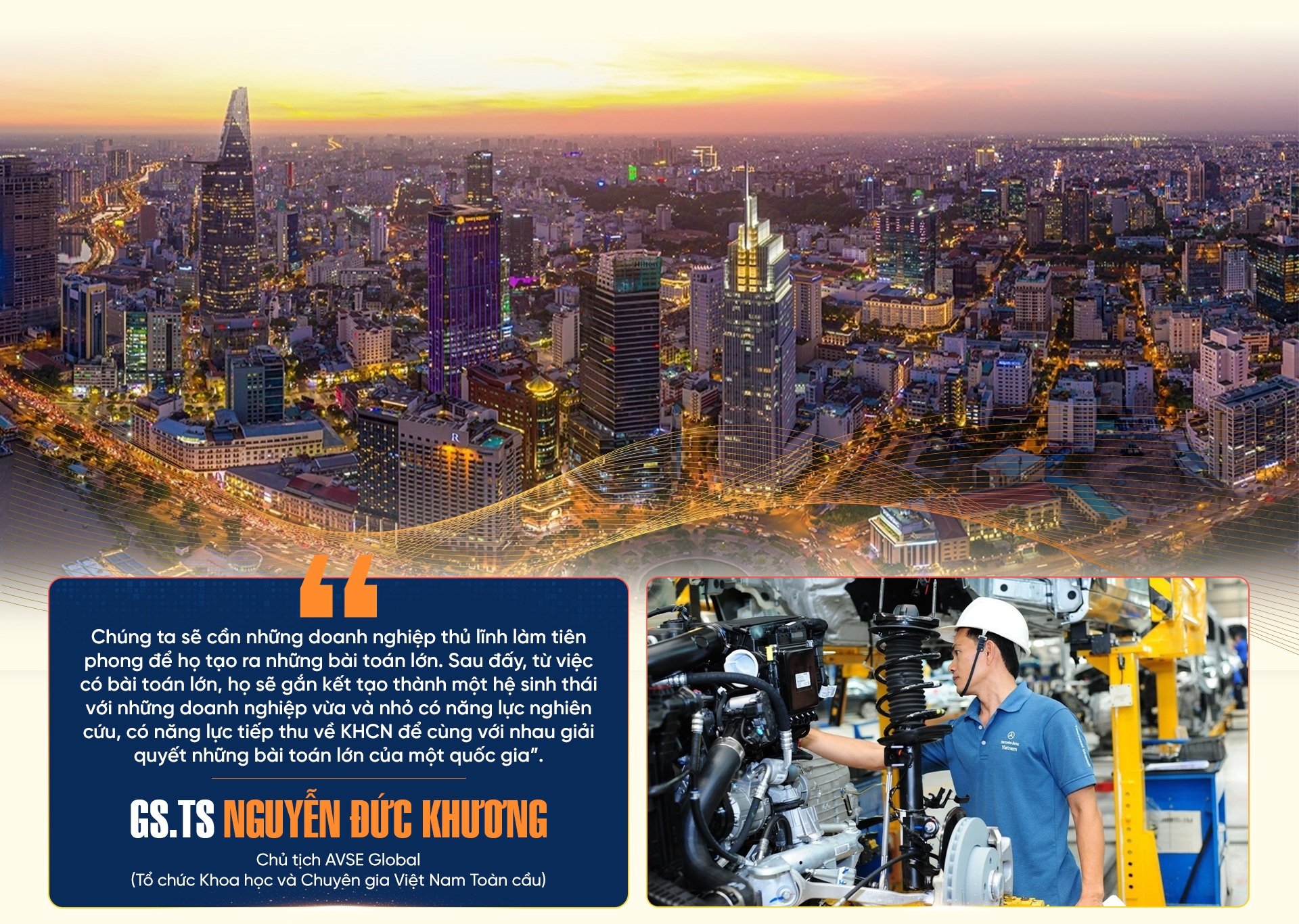


![[Photo] Politburo works with the Standing Committee of the Party Committee of the Fatherland Front and Central organizations](https://vphoto.vietnam.vn/thumb/1200x675/vietnam/resource/IMAGE/2025/9/4/6f23e5c0f576484bb02b3aad08f9d26a)
![[Photo] Politburo works with the Standing Committee of Can Tho City Party Committee](https://vphoto.vietnam.vn/thumb/1200x675/vietnam/resource/IMAGE/2025/9/4/10461762301c435d8649f6f3bb07327e)

![[Photo] Prime Minister Pham Minh Chinh chairs the thematic meeting on law making in August 2025](https://vphoto.vietnam.vn/thumb/1200x675/vietnam/resource/IMAGE/2025/9/4/ba42763cd48e4d7cba3481640b5ae367)
![[Photo] Prime Minister hands over decisions on receiving, transferring and appointing leaders of ministries and agencies](https://vphoto.vietnam.vn/thumb/1200x675/vietnam/resource/IMAGE/2025/9/4/b2445ecfd89c48bdb3fafb13cde72cbb)
![[Photo] Politburo works with the Standing Committee of Lai Chau Provincial Party Committee](https://vphoto.vietnam.vn/thumb/1200x675/vietnam/resource/IMAGE/2025/9/4/f69437b9ec3b4b0089a8d789d9749b44)








![[Photo] Beautiful images of the marching blocs at the 80th National Day Celebration](https://vphoto.vietnam.vn/thumb/402x226/vietnam/resource/IMAGE/2025/9/2/2ae930dfd77b442f9ac75f181d7f4bd6)














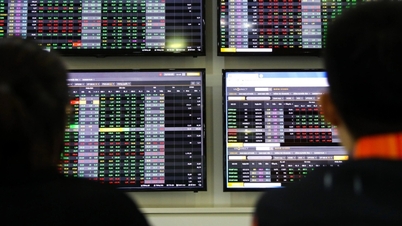







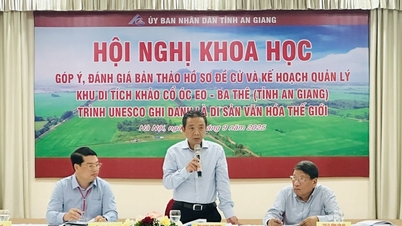






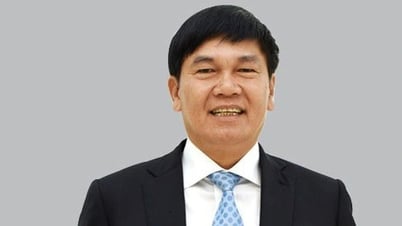












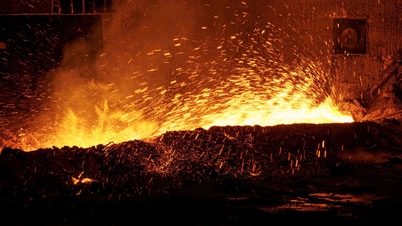



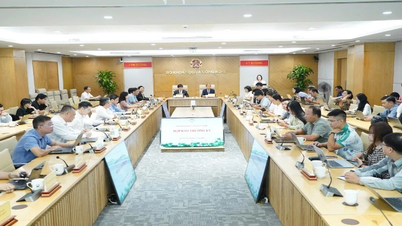







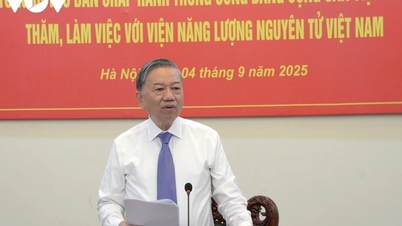




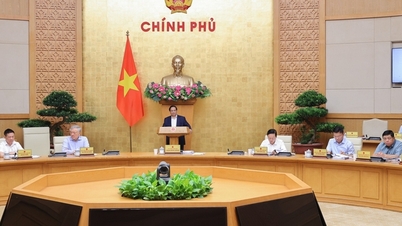

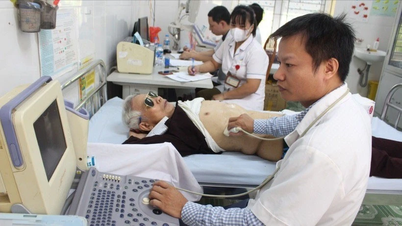









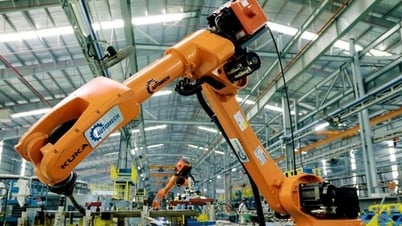




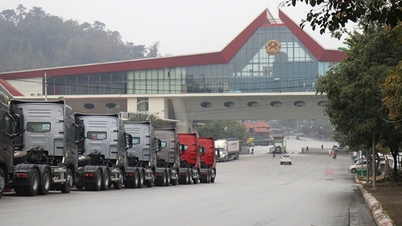






Comment (0)